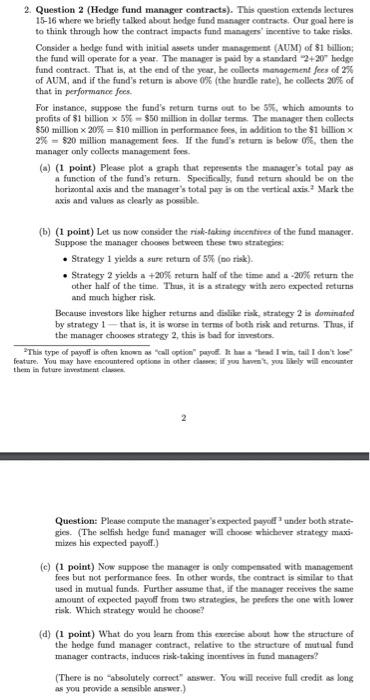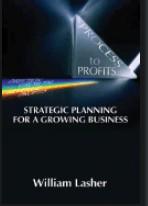Answered step by step
Verified Expert Solution
Question
1 Approved Answer
Answers for A, B, C, and D needed 2. Question 2 (Hedge fund manager contracts). This question extends lectures 1516 where we briefly talkod about
Answers for A, B, C, and D needed 
2. Question 2 (Hedge fund manager contracts). This question extends lectures 1516 where we briefly talkod about hodge fund manuger contracts. Our goal here is to think through how the contract impacts fund managers' incentive to take risks. Consider a beelge fund with initial assets under mansgemert (AUM) of $1 billion; the fund will operate for a year. The manager is puid by a staxxard 2+20 bedgo fund contract. That is, at the end of the year, be collects management fees of 2% of AUM, and if the fund's return is above 0% (the hurdle rate), be collects 20% of that in performanoe foes. For instance, suppose the fund's return turns out to be 5%, which amounts to profits of $1 bilion 5%=$50 asillian in dollar terms. The managir then collects $50 million 20%=$10 million in performance foes, in addition to the $1 billion x 2%=$20 million management foes. If the fund's return is below 0%, then the manager only collects managraent foes. (a) (1 point) Please plot a graph that repeesents the manager's total pay as a function of the fund's return. Specifically, fund return should be on the harixontal axis and the mannger's total pay is on the vertical axix. 2 Mark the axis and values as clearly as possible (b) (1 point) Let as now consider the risk-teling incentives of the fund manager. Suppose the manager chooses between these two strategies: - Strategy 1 yields a sure return of 5% (no risk). - Strategy 2 yields a +20% return half of the time and a 209% return the other half of the time. Thus, it is a strategy with zero expected returns and much higher risk. Becanse investors like higher returns and distilos risk, strategy 2 is dominated by strategy 1 - that is, it is worse in terms of both risk and returns. Thuss, if the manager chooses strategy 2 , this is bad for investors. tare. You may have encountered options in other rlasees, if you haven't, you likily will encounter m in future imnatanent elwoon. Question: Please compute the manager's expected payodI 2 under both strategies. (The selfish hedge fund manager will choose whichever strategy maximixes his expected payod.) (c) (1 point) Now suppose the manager is only compensated with managersent fees but not performance fees. In otber wonds, the contract is similar to that used in mutual funds. Furtber assume that, if the manager receives the same amount of expected payof froen two strategios, be peefors the one with loser risk. Which strategy would be choose? (d) (1 point) What do you bearn from this exercise about how the structure of the hedge fund manager cotatract, relative to the structure of matual fund manager contracts, induces rikk-taking incratives in fund managers? (There is no "aboolutely correct" asswer. You will receive full credit so long as you provide a sensible answer.) 
Step by Step Solution
There are 3 Steps involved in it
Step: 1

Get Instant Access to Expert-Tailored Solutions
See step-by-step solutions with expert insights and AI powered tools for academic success
Step: 2

Step: 3

Ace Your Homework with AI
Get the answers you need in no time with our AI-driven, step-by-step assistance
Get Started


